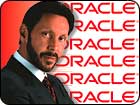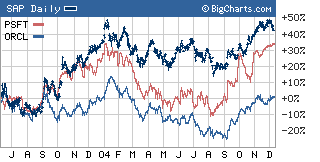NEW YORK (CNN/Money) -
Oracle Corp. Monday finally struck a deal to buy PeopleSoft, ending its 18-month hostile takeover battle.
Oracle (Research) said it is paying $10.3 billion in cash, or $26.50 a share, for the rival business software developer. That's up nearly 11 percent from PeopleSoft's (Research) Friday close of $23.95.
Shares of Oracle surged 9 percent while PeopleSoft's stock shot up more than 10 percent in Monday afternoon trading.
Oracle's previous offer for PeopleSoft had been $24, or $9.2 billion, a price it had insisted was its last and best offer. Oracle announced last month that 61 percent of PeopleSoft's shares had been tendered to it at that lower price. Oracle said that it is extending its current tender offer until Dec. 28 to reflect the higher bid.
Oracle Chief Executive Officer Larry Ellison said during a conference call with analysts Monday morning that PeopleSoft approached Oracle over the weekend in order to negotiate a friendly deal and that as a result of some of the data PeopleSoft provided about its business, Oracle was willing to raise the purchase price again.
The original offer in June 2003 had been for $16 a share, or $5.1 billion. Oracle raised its offer several times and even lowered it once during the course of the hostile bid. The company's previous high was an offer of $26 a share.
But PeopleSoft's board had continued to resist the offer, and a drawn-out court battle or possible proxy fight loomed.
End to hostilities
The two companies were scheduled to return to a Delaware court this week. Oracle had sued PeopleSoft in an attempt to have PeopleSoft's so-called "poison pill" takeover defense removed. Ellison said Monday morning that all outstanding litigation between Oracle and PeopleSoft will now be dismissed.
 |
|
| It took a year and a half, but Oracle CEO Larry Ellison finally succeeded in winning the battle for PeopleSoft. |
He also stressed during the call that Oracle planned to support and enhance existing software made by PeopleSoft as well as products developed by J.D. Edwards, another software company that PeopleSoft acquired last year.
There had been some concern on the part of PeopleSoft that Oracle was merely seeking to buy PeopleSoft for its lucrative base of application software customers and was not interested in supporting the company's products.
However, several analysts said it was unlikely that Oracle would look to have PeopleSoft develop much in the way of new technology. That could mean a sizable amount of job cuts at PeopleSoft.
"This is a financial acquisition primarily," said John DiFucci, an analyst with Bear Stearns. "Oracle is buying PeopleSoft for its maintenance stream."
To that end, it's worth noting as well that PeopleSoft executives, including CEO and company founder David Duffield did not join Oracle during Monday's conference call. What's more, PeopleSoft put out a separate press release to announce the deal.
In that statement, the company said Oracle's new offer represented, "good value for PeopleSoft stockholders."
"This has been a long, emotional struggle, and our employees have consistently performed well under the most challenging of circumstances," said the statement from A. George "Skip" Battle, chairman of the PeopleSoft board's Transaction Committee.
Watch out SAP?
Oracle, which generates the majority of its sales from its flagship database software, has struggled to compete with the likes of PeopleSoft and industry leader SAP in the field of application software, which businesses use to automate routine corporate tasks such as human resources and supply chain management.
A combined Oracle-PeopleSoft could be a tougher competitor to SAP, which many analysts say has benefited from the turmoil that the year-and-a-half long takeover battle has created in the software market. Shares of SAP rose slightly in pre-market trading Monday morning.
 |
|
| Shares of SAP have outperformed PeopleSoft and Oracle during the 18-month takeover battle. |
But SAP, and other large software companies like Microsoft, could continue to benefit as Oracle and PeopleSoft take on the challenge of integrating their two firms.
"This should have happened a year and a half ago," said Trip Chowdhry, an analyst with FTN Midwest Research. "If the deal had been done then, the synergies and market share wins would have been so phenomenal that SAP and Microsoft would not have taken market share away."
Oracle said it hopes that the deal will be closed by January. The company added that it expects the merger to add one cent per share to its earnings for the fiscal fourth quarter and about eight cents per share in fiscal 2006. Oracle Chief Financial Officer Harry You said that any debt incurred to pay for the PeopleSoft deal should be paid off within two years.
But one analyst said the PeopleSoft deal could be just the beginning of a wave of purchases by Oracle.
"There will be a period of indigestion but it wouldn't surprise me to see Oracle back in late 2005 buying somebody else," said Richard Williams, an analyst with Garban Institutional Equities.
Ellison admitted Monday morning that Oracle is still interested in doing more software deals but that the company is unlikely to take on another big purchase while it is integrating PeopleSoft.
Other software mergers are likely as well as companies may rush to bulk up in order to more effectively compete in a market that is starting to mature.
"Companies are working towards a rationalization of the software industry because the growth rate is permanently declining," said DiFucci.
Separately, Oracle announced a better-than-expected gain in second-quarter earnings.
"The real highlight of our most recent quarter was the 57 percent growth in our applications business, and this merger is going to make that applications business bigger and stronger," said Ellison in a written statement.
You added that Oracle expects sales for its fiscal third quarter, which ends in February, to be between $2.7 billion and $2.9 billion, ahead of Wall Street's consensus forecast of $2.64 billion. You also said Oracle was comfortable with the consensus earnings per share estimate of 14 cents per share for the quarter.
Analysts quoted in this story do not own shares of companies mentioned and their firms have no investment banking relationships with the companies.

|

